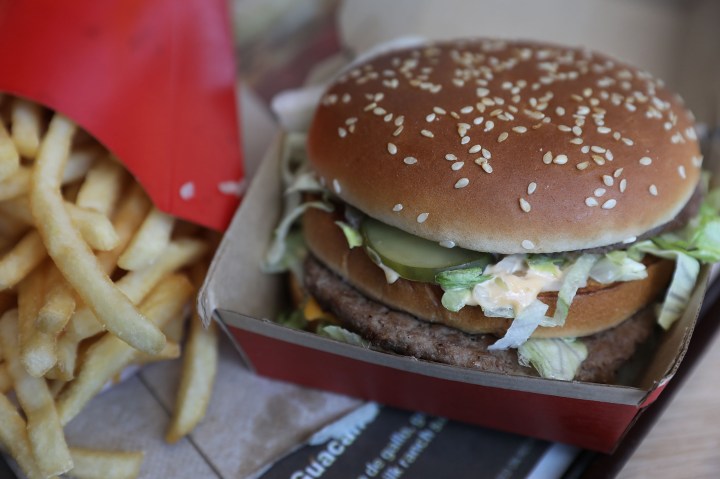
If wages go up, do fast-food prices have to go up too?
Share Now on:
If wages go up, do fast-food prices have to go up too?

Your burgers and fries are probably getting more expensive.
The good news is that overall inflation appears to be cooling down. Consumer prices remained unchanged in October from the previous month, according to the Labor Department’s consumer price index. But year-over-year data shows that prices for “food away from home,” which includes meals at restaurants, rose 5.4%. Prices at fast-food chains, specifically, went up 6.2%.
Ben Coley, the editor of QSR magazine, told Marketplace earlier this year that lower-income consumers are cutting back on fast food, while richer customers are “trading down” from fine dining and gravitating toward fast-food restaurants.
National chains hiked prices amid the pandemic in response to factors that included supply chain shortages, rising commodity prices and higher labor costs.
Prices may continue to rise as pay standards improve in the sector. In California, the minimum wage for fast-food workers will be set at $20 on April 1. In May 2022, those workers made an average of $16.60 an hour, according to Labor Department data.
During the company’s latest earnings call, McDonald’s CEO Chris Kempczinski said “there is going to be a wage impact for our California franchisees.”
It’s still too early, though, to quantify that impact. “I don’t think at this point we can say exactly how much of that is going to work its way through pricing,” he added.
And in Chipotle’s latest earnings call, Chief Financial Officer Jack Hartung echoed Kempczinski’s view, saying the California minimum wage hike will “be a pretty significant increase to our labor.”
“We haven’t made a decision on exactly what level of pricing we’re going to take,” Hartung said. “It’s going to be a mid-to-high-single-digit price increase, but we are definitely going to pass this on. We just haven’t made a final decision as to what level yet.”
Michael Reich, an economics professor at the University of California, Berkeley, explained that fast food has typically been cheap partly because wages have generally been low. Reich is also chair of the Center on Wage and Employment Dynamics at the university’s Institute for Research on Labor and Employment.
He called the pay gains “a good trade-off” because improving the minimum wage will reduce income inequality in the U.S.
A study from the Economic Roundtable found that fast-food workers comprise 11% of all homeless workers in California. Fast food has the “highest rate of poverty employment of any industry” in the state, Roundtable President Daniel Flaming told Marketplace.
But it’s not a forgone conclusion that higher wage costs for chains have to drive prices up for customers. To compensate for cost pressures, Reich said some cash could come from executive pay or shareholder returns.
John Logan, the director of labor and employment studies at San Francisco State University, said he doesn’t think prices have to increase and that raising them is “a choice by the industry.”
“It’s not inevitable that will happen,” he argued.
Logan pointed out that since the late 1970s, the pay gap between CEOs and average workers in the U.S. has become much wider. In 2022, CEOs made 344 times as much as the typical worker, according to the left-leaning Economic Policy Institute. Figures from Investor’s Business Daily in 2019 showed an even bigger gap in the fast-food sector.
And although wage growth has been sluggish in the industry, companies have still raised prices, Logan pointed out.
Labor leaders in other industries have called attention to similar issues. During the United Auto Workers strike, there was concern that car prices would go up in tandem with wages. But the UAW noted that car prices increased before the strike, per USA Today, even though wages didn’t.
“They could double our wages and not raise car prices and still make billions of dollars in profit,” UAW President Shawn Fain said in a presentation to members.
In 2022, the Economic Policy Institute suggested that corporate profits could decline to accommodate minimum wage increases.
“Lower profit margins are a huge potential absorber of any price pressures in coming years — particularly those as small as what a minimum wage increase would impose,” the EPI wrote.
In the case of McDonald’s, the chain uses a franchise model, and operators worry that their business models can’t handle these wage increases, Restaurant Business Online reported.
But, Logan said, if your business can be sustained only by paying inadequate wages, then it should change.
He thinks the executives at these companies, those with the “power and control,” need to be held responsible for running an industry in which franchisees can make a profit and workers “can actually earn a living wage with decent working conditions.”
There’s a lot happening in the world. Through it all, Marketplace is here for you.
You rely on Marketplace to break down the world’s events and tell you how it affects you in a fact-based, approachable way. We rely on your financial support to keep making that possible.
Your donation today powers the independent journalism that you rely on. For just $5/month, you can help sustain Marketplace so we can keep reporting on the things that matter to you.


















